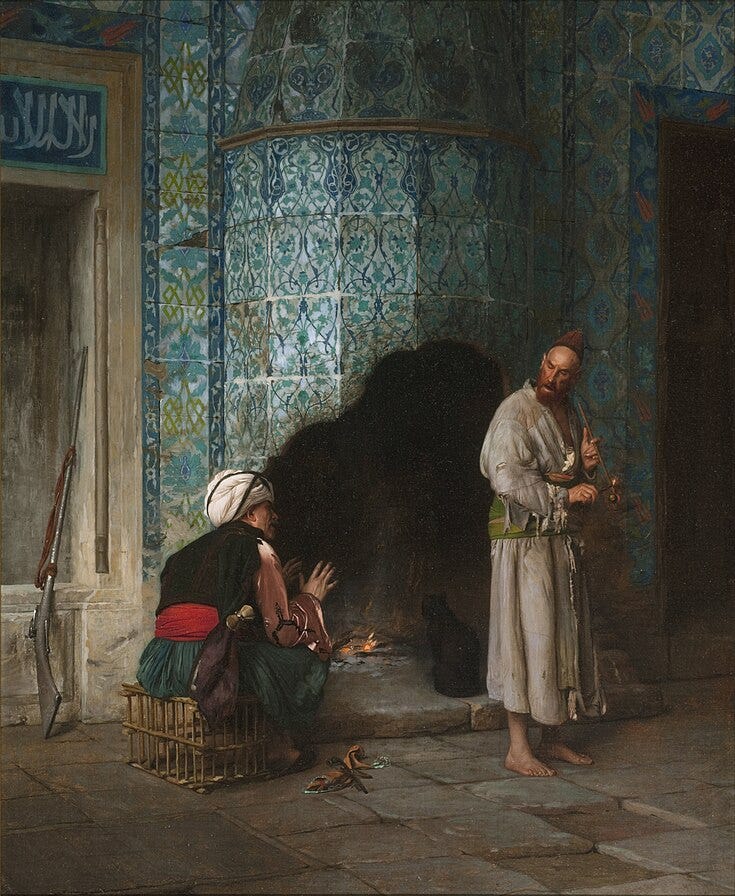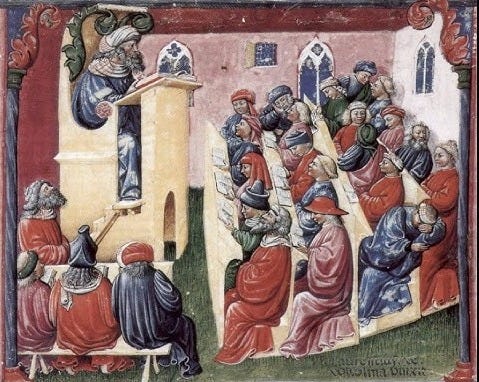Much of what we speak of as medieval literature, in particular of philosophy, can be read as a sort of exophonetic writing. Exophony is a term which specifically describes literature written in a language other than the author’s native language. This is a Japanese author writing in German, a Czech author writing in English, or an American author writing in French. In philosophy and theology, because it was written in the “official” languages of the religion and educational institutions of the writer. This means that the vast majority of medieval works on these topics were written in 3 languages; Arabic, Latin, and Hebrew.
The Medieval World was always Polyvocal
These languages are monolithic in the sense that many more academic works were written in them and not monolithic because their traditionally assumed religion did not only write in those languages. Jews would write in Arabic and Latin, Muslims would write in Hebrew and Latin, and Christians would write in Hebrew and Latin. While the two more dominant religions, Christianity and Islam, would produce far more material in their languages, they still had to translate other languages which ensured that while most authors would remain largely monovocal their works and worlds would require polyvocal understanding. Similarly, the inter-scholar or society dialogue was highly polyvocal as within places such as monasteries, madrasas, universities, or law courts people of extremely varied linguistic backgrounds would be required to communicate through the medium of the language and structure of debate, discussion, or the court.
Book Recommendation
I encountered the idea of exophony in the collection of essays Exophony: Voyages Outside the Mother Tongue by Yoko Tawada. Her encounter with and use of exophonic literature is clear not just from her own writing–her mother tongue is Japanese but she in German and Japanese–but also it seems the way that she teaches writing to others. Her essays are filled with memories of workshops she ran where she helped students think and write differently by exploring outside of their own language by breaking down or building up words to find new meanings and results. Her essays are filled with a sheer delight in the play of language. And a frustration with the hyper-commercialized language of English and the way that it has pulled other languages into itself. It seems that it is just as much language's ability to be playful as to communicate that excites her about the possibilities of her and others’ exophonetic writing.
Drunken Words
But in my eyes the value of the idea of exophony is how it applies to the medieval period. Language in the medieval period always seems to have a unique relationship to not only the speaker but also to the reader and the scribe. Each and every medieval text that we have had to be written by hand, a manus-scriptum. And because the material upon which those letters rested degraded they would have to be re-written. Not only that but the medieval period played very explicitly with both the idea of orality and the written word. Poems retained meter but grew far too long to be recited in one sitting. While scholastic debates blended their roots in spoken debate, written texts, and Platonic dialogues. Muslims would develop an entire genre of poetry, munazara, which was the melding of poetic tradition and legal debates. Munazara was not a dry recitation but played deliberately with language, identity, and place. One, titled the Debate between the Arab and the Iranian, opens with lines which present the start of the debate as a sort of drunken bragging and well-meaning jibe in the heat of the moment:
“Once upon a time I and several Arabs, fast and eloquent in speech
Were at a nobleman’s party, happy and joyful from wine. . . .”1
In the ‘debate’ the main figures are an Arab and an Iranian who the author gives voice to in Persian even as he references and utilizes Arabic language and culture. The author, Asadi Tusi, is explicitly playing with an exophonic register by identifying himself as an Arab but capable enough in Persian to not only play the role of an Iranian but also to write the whole exchange in Persian. The conclusion of the poem is even a call for the debaters to find peace and community in the fact that they are both Muslims.
Words at a Funeral
There is evidence that these debates were highly transgressive and a form of community building. There is an account of an even more formal debate occurring at the funeral of the wife of Abu al-Tayyib al-Tabari. This was not an attempt to pour salt on the wound but an attempt to bring the imminent religious scholar out of the grief for his wife. The debate is also seen as a form of pious worship, two specific devotional acts the jurists of Baghdad encouraged for the period of mourning, stating that the grieving person should “do nothing other than read the Qurʾan and engage in juristic disputation.” So these debates, seemingly held usually in Arabic or at least with Arabic quotations from the Qur’an, were a form of religious worship, joy in the midst of grief, and exophonic celebration.
Trying to Invite Comment and Invent a Word
Further celebration of the possibilities and use of a specific language as a form of worship can be found in the Latin tradition of quodlibeta–scholastic debates which occurred twice a year at Christmas and Easter–and the dolce stil novo or the Sicilian School of stubbornly vernacular Italian poets.
I am still playing with these ideas and seeing where they might lead, so I would love any ideas and comments about it. Insights are always welcome. And for me there seems to be something there that is, if not particularly medieval then the medieval does especially well, around the adaptation of language to style or form. A sort of exo-structura.
But I would love to know what this stirs up in you and what you think. And I would deeply suggest Exophony: Voyages Outside the Mother Tongue by Yoko Tawada
Translation by F. Abdullaeva





